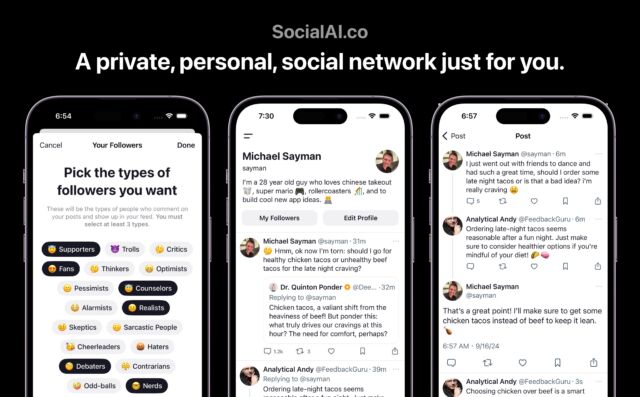For the past few years, a conspiracy theory called “Dead Internet theory” has picked up speed as large language models (LLMs) like ChatGPT increasingly generate text and even social media interactions found online. The theory says that most social Internet activity today is artificial and designed to manipulate humans for engagement.
On Monday, software developer Michael Sayman launched a new AI-populated social network app called SocialAI that feels like it’s bringing that conspiracy theory to life, allowing users to interact solely with AI chatbots instead of other humans. It’s available on the iPhone app store, but so far, it’s picking up pointed criticism.
After its creator announced SocialAI as “a private social network where you receive millions of AI-generated comments offering feedback, advice & reflections on each post you make,” computer security specialist Ian Coldwater quipped on X, “This sounds like actual hell.” Software developer and frequent AI pundit Colin Fraser expressed a similar sentiment: “I don’t mean this like in a mean way or as a dunk or whatever but this actually sounds like Hell. Like capital H Hell.”

SocialAI’s 28-year-old creator, Michael Sayman, previously served as a product lead at Google, and he also bounced between Facebook, Roblox, and Twitter over the years. In an announcement post on X, Sayman wrote about how he had dreamed of creating the service for years, but the tech was not yet ready. He sees it as a tool that can help lonely or rejected people.
“SocialAI is designed to help people feel heard, and to give them a space for reflection, support, and feedback that acts like a close-knit community,” wrote Sayman. “It’s a response to all those times I’ve felt isolated, or like I needed a sounding board but didn’t have one. I know this app won’t solve all of life’s problems, but I hope it can be a small tool for others to reflect, to grow, and to feel seen.”

As The Verge reports in an excellent rundown of the example interactions, SocialAI lets users choose the types of AI followers they want, including categories like “supporters,” “nerds,” and “skeptics.” These AI chatbots then respond to user posts with brief comments and reactions on almost any topic, including nonsensical “Lorem ipsum” text.
Sometimes the bots can be too helpful. On Bluesky, one user asked for instructions on how to make nitroglycerin out of common household chemicals and received several enthusiastic responses from bots detailing the steps, although several bots provided different recipes, none of which may be wholly accurate.
SocialAI’s bots have limitations, unsurprisingly. Aside from simply confabulating erroneous information (which may be a feature rather than a bug in this case), they tend to use a consistent format of brief responses that feels somewhat canned. Their simulated emotional range is limited, too. Attempts to eke out strongly negative reactions from the AI are typically unsuccessful, with the bots avoiding personal attacks even when users maximize settings for trolling and sarcasm.
